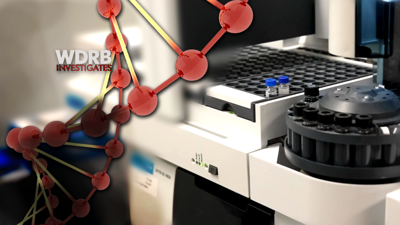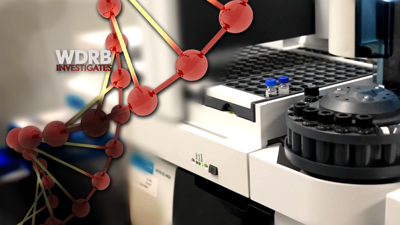LOUISVILLE, Ky. (WDRB) -- When Tracy Kenemore, a traffic control officer for 21 years with the Louisville Metro Police Department, was murdered in 2020, prosecutors and police were desperate to quickly get DNA tested on clothing from a suspect to make an arrest.
Knowing such testing at the severely backlogged Kentucky State Police Forensic Laboratory could take as long as two or three years, officers asked police in the department's cold-case unit if they knew any shortcuts.
And they did — use a private lab, which is expensive but much quicker.
Within just a few months, the police got the testing they needed from a Florida DNA laboratory, which led to the arrest of Kenemore's son. Nyiesha Mulinda, Kenemore's daughter, said she never expected the DNA results to come back so quickly, and it helped lesson the anguish her family was going through.
"Without that DNA, they wouldn't have been able to get him," she said. "They questioned him and had to release him because they didn't have any evidence."
This was the genesis of a 2021 contract LMPD signed with DNA Labs International in Florida.
Maj. Jill Bates, with the department's major crimes division, said the decision to send evidence from murders, violent crimes and sex crimes has become more prevalent in the past few years, and two departments in the state — Lexington and Bowling Green — are doing the same.
"The problem is KSP serves not only LMPD but the entire state," she said. "We were creating a backlog. The average turnaround time was anywhere from 24 to 36 months ... which kept defendants out on the streets longer."
Now, by using the private lab, Bates said the standard turnaround to get DNA tested is six to eight weeks and even quicker if the department pays more.
The KSP lab was free for LMPD, while the Florida lab costs the department about $2.3 million a year. KSP also doesn't prioritize cases, taking them in order regardless of whether police believe the case should be moved to the top of the pile.
Bates believes the quick turnaround in getting DNA for trials has helped with convictions and lengthier sentences. The cases are fresher, she said, which helps with the memories of witnesses and ensures there are fewer issues with the admission and reliability of DNA evidence. It also lessens the backlog of pending criminal cases, long a problem in Louisville.
"They are using cutting edge technology, providing excellent services ... and we are getting results," Bates said. "Ultimately, we are focused on seeking justice for victims and their families.
Assistant Commonwealth's Attorney Elizabeth Jones Brown said KSP couldn't even accept all of LMPD's cases, like possession of a handgun by a collected felon, because of the backlog.
Now, the wait for evidence is no longer holding up trials, plea bargains and has drastically cut the time people are sitting in jail or out on the streets waiting for their day in court.
Those staying in jail waiting years for DNA results are costing taxpayers. Meanwhile, frustrated victims or their family feel as if they may never get legal closure.
Right now, LMPD is paying out of its general budget, and there has been no request for more funding from the city. However, that could change.
"... We absolutely, definitely need to see a budget increase" to use the lab for even more kinds of cases, Bates said. "It's worth it to bring justice, to make our community feel safer."
'Nonsensical'
While the quicker turnaround in evidence has been a benefit, some issues with the Florida lab have raised questions, confusion and problems for defense attorneys, prosecutors and judges.
In fact, one judge is threatening to hold the lab in contempt for failing to follow orders that she said violates the constitutional rights of the defense.
For starters, the lab has prohibited experts for the defense from being present or at least watch on Zoom when DNA testing may consume or destroy all of the sample — a right the defense has in Kentucky.
Last July, a prosecutor in the murder case of Elton Pulliam told Jefferson Circuit Court Judge Sarah Clay no in-person testing was allowed in the Florida lab.
"They will never allow someone to be brought in to observe — ever," said Assistant Commonwealth's Attorney Morgan Profumo, according to a video of the hearing.
And the defense was going to be charged $10,000 to watch video of DNA testing, she said.
"We've been trying to get ahold of the procedures and we can't get ahold of anything from the lab," Profumo said. "I can't even get direct contact with the lab so I'm having to go through an LMPD officer, who is a liaison with the lab. ... It's nonsensical, if I do say so myself."
Bates said she hasn't heard about any prosecutors having problems getting information from the lab.
And Clay said she isn't sure she would allow a jury to "consider a lab result where the lab has denied the defense access to that testing.
During the hearing, the judge asked how much the lab was getting paid, and Profumo and defense attorney Ryan Dischinger said they couldn't find out, with Dischinger saying an open records request to police was mostly redacted.
A similar request from WDRB News was also heavily redacted.
The judge asked that someone from the lab appear to testify, but the issue ended up being resolved before testimony was necessary.
Not so in other cases, however. And the problems are continuing.
Just last month, on Jan. 29, Jefferson Circuit Court Judge Annie O'Connell said the Florida lab was requiring a judge to sign a consumption order for every item that was going to be tested, regardless if it was likely the evidence would be destroyed, according to a video of the hearing.
"It makes me uncomfortable," O'Connell said. "These are issues that need to be ironed out."
In addition, O'Connell said she was concerned with the lab's refusal to allow the defense to be present for a DNA test in which the evidence is destroyed and would be sending emails to other judges and police departments sharing her issues.
"We're all learning about how to deal with DNA Labs International," Assistant Commonwealth's Attorney Layla Lutfi said. "This is part of the growing pains."
The case in front of O'Connell is delayed while the issue is worked out.
While police have said they don't yet have answers for some of the problems officials in the courts are having, someone from the lab is scheduled in a different case Feb. 25 to explain to the judge why the lab shouldn't be held in contempt for failing to follow orders.
In a statement, the Florida lab said the defense is not allowed to observe DNA testing unless ordered by a judge and then only through video after the procedure.
On Jan. 9, in another criminal case in front of Clay, defense attorney Mark Hall said the lab hadn't responded to a court order they cooperate with the defense expert in allowing access to testing. The fact that the lab may have already tested DNA without the defense present could cause "monumental issues" in the case, Clay said.
"So not only do they refuse to test material unless they get permission to destroy it, even if another lab may not have to destroy it ... they also make it extremely difficult for defense experts to participate," Clay said. "Which, in combination, really causes me a lot of concern. Obviously, there is a reason a defendant has a constitutional right to have an expert present and participate in DNA testing and there's also a reason why you are not supposed to consume genetic material unless you absolutely have to while you are testing it."
Clay refused to sign an order that the Florida lab may destroy a piece of evidence, a bone, during testing.
The prosecutor said the lab requires consumption orders for all testing as a matter of legal policy, just in case something goes wrong.
"I do not find it acceptable that it is just simply their legal policy," Clay said. "I don't really care what their legal policy is. If they are accepting a contract with the commonwealth ... I would expect them to comply with the law here."
Bates said LMPD will comply with all court orders. She didn't know details about the consumption orders.
The case is now postponed as Clay issued an order for from someone at the lab to testify Feb. 25.
"Ultimately, this evidence may be suppressed (not allowed to be used) and not come in at trial," the prosecutor acknowledged.

The KSP lab was free for LMPD, while the Florida lab costs the department about $2.3 million a year.
Copyright 2025 WDRB Media. All Rights Reserved.












